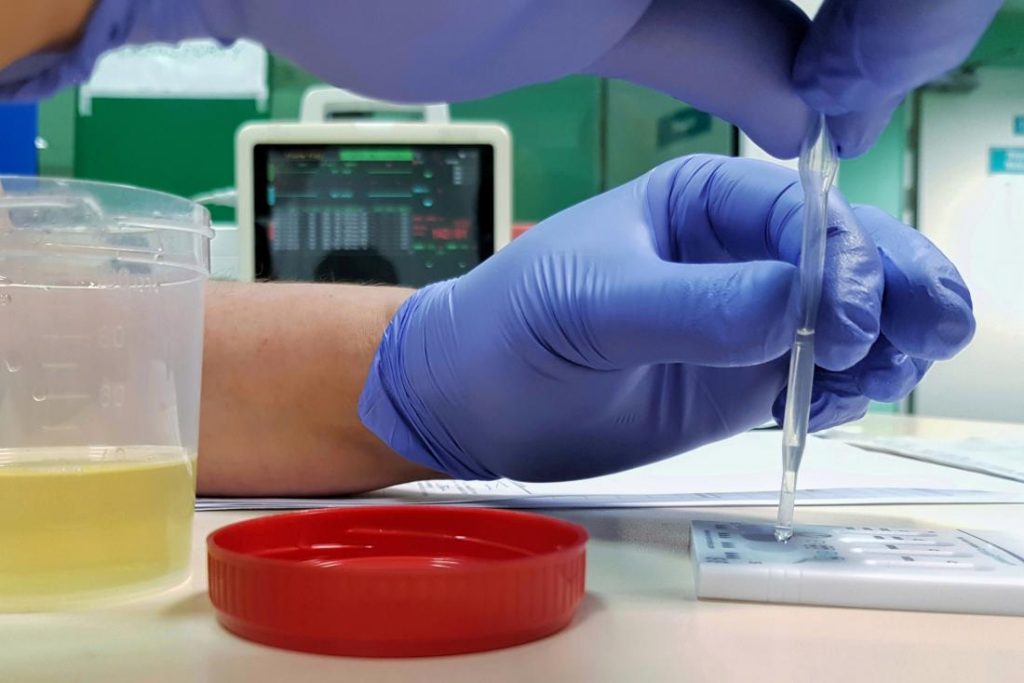Japan Developed a Self-screening Urine Test That Detects Depression and Other Mental Illness

The World Health Organization (WHO) announced in July that the pandemic and the successive confinements will have a “long-term” impact on all populations. Fear of contracting the virus, the consequences of unemployment, and isolation have considerably affected women as well as men, who may not systematically turn to a health professional to deal with certain mental health disorders such as anxiety, stress, or depression.
In Japan, a company has taken the problem in hand by developing urine tests to allow everyone to self-diagnose, as reported by Saga Shimbun. The kits will soon be available online, and will allow, via a simple urine sample to be deposited in pharmacies or sent by mail, to evaluate the risk factors of a person for certain mental illnesses. The user in question, after analyzing his or her urine, will have the results sent to his or her smartphone.
The limits of self-testing
Self-testing for mental illnesses is not new, but it is not common either. And for good reason: their effectiveness is controversial. These new urine tests would not actually detect a specific mental illness, but rather determine if a person is likely to develop one. Two different things, in short. In case of a positive test, it is advisable to consult a mental health professional.
The objective is to allow as many people as possible to carry out these tests discreetly and to become aware of their potential risk. It is a first step towards taking charge of the situation, which is far from easy for many people. These kits will be available from the end of the month, online and in pharmacies, in the six prefectures of the Tohoku region, at a price between ¥3,000 and ¥4,000 (between €23 and €31, or about P1,300 and P1,800 approximately).
Other ways to detect depression
Many researchers around the world are working on new methods to facilitate the detection of mental illnesses such as depression. Recently, researchers from Indiana University have unveiled work on a blood test that could detect depression or bipolar disorder, and also determine the most appropriate treatments.
British scientists are interested in earwax, whose level of cortisol, the hormone involved in stress when it is secreted in excess, could also detect certain anxiety disorders as well as depression.
Although progress is being made, mental illness still carries a stigma in Japan, making it harder for many people to seek the help they need. It’s especially a problem among the older generation, but when the bulk of the population is elderly, it becomes everyone’s problem.
Luckily, one potential solution has arrived in a test kit developed by Cellspect, a medical equipment supplier in Morioka City, Iwate Prefecture. From late August, these kits will be made available online and at drugs stores in the six prefectures of the Tohoku region (Akita, Aomori, Fukushima, Iwate, Miyagi, and Yamagata) for between 3,000 and 4,000 yen each.
Those who purchase the test must first collect a urine sample and then submit it either by mail or directly at participating drug stores. The urine will then be analyzed to assess the owner’s risk factors for mental illnesses such as depression and the results can be sent directly to their smartphone.
It’s important to note that these tests do not diagnose mental illness but instead gauge a person’s potential for developing one. If a high risk is found, then that person should seek a professional diagnosis to know if they are currently suffering from such an illness or what steps they should take to prevent it in the future.
Urine tests to detect mental illness symptoms themselves are not new and are somewhat controversial as to their effectiveness. However, as a discreet way for people take that first step into examining their own mental health, these self screen kits could make a significant difference in Japan.
Some readers of the news were also tempted to try one, despite being confused about how it works.
“Why don’t they do that with the urine test at my annual physical?”
“I kind of want to try this…”
“Companies should just install these kits directly in their toilets.”
“Huh, this could be good.”
“They can do that with urine?”
“Isn’t it just a test for anti-depressant drugs?”
“Is depression such a thing? I didn’t think you could detect mental things with urine, but if a medical supply company can do it, I guess it is possible.”
Some of the confusion displayed in the comments show how mental illness is often misunderstood as not even a medical problem, making proper treatment that much more difficult. This uncertainty combined with a sense of embarrassment would often have people resort to self-diagnosing online among all its misinformation.
This new kit gives that same sense of privacy but from a more reliable source that can also help people get on the right track to proper mental health. It may not change the world, but every little bit counts.








